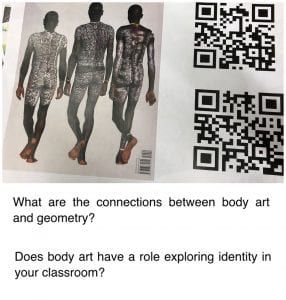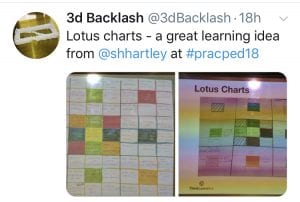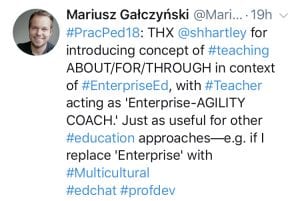
Image courtesy of Practical Pedagogies via a tweet
Look! Look! Look!
I can see hundreds of teachers voluntarily gathering for the sharing of pedagogical ideas. I can hear a cacophony of accents as they chatter earnestly making new connections and friends. I see Russel Tarr, one of the first few international connections I made on Twitter nearly 10 years ago. He organised this conference at St. Georges’ School, Cologne, from Toulouse, in his spare time. I have found Russel to be deeply intelligent, skilful and passionate about education and continuous learning. Through this conference he has also demonstrated how incredibly organised he is too.
Look! Look! Look!
I can see a pumpkin patch of golden nuggets. I’ll list 12 of the biggest and brightest nuggets from the conference in a rough chronological order:
-
- I met Jared, a science teacher from North Carolina, USA, when we sat down for the opening of the conference. He has a delightful American drawl and repeatedly called me ma’am which was equally uncomfortable and endearing. His commitment to teaching and life in general made a warm golden moment to start the conference.
- Hywel Roberts‘ opening address. I had spent the previous couple of weeks reading Hywel’s book Oops! in preparation. Unfortunately, I wasn’t that fond of the book since I felt it to be a little patronising but in person Hywel was very entertaining. I laughed often and loudly. After a while his educomedy style felt like it was going too long and I became silently critical of the lack of substance. He must have read my mind because he reassured the audience that substance was coming soon. And it did. His message about narrative and story-telling (Look! Look! Look! I can see…) through relationships with students provided a good reminder of the joy and wonder teaching and learning can create. I also liked his three key words:
- Imagineering (aka VISION – visionary teacher): Thinking and planning for teaching to make curriculum palatable without dumbing it down. This takes professional imagination which unfortunately can often be eroded over time.
- Botheredness (aka MISSION – caring teacher): Demonstrating authentic care, being the caring adult (not at war with children) and building botheredness in students for the work they’re doing in class
- Phronesis (aka VALUES – wise teacher): professional wisdom
- An Action Research Observation Sheet from a session led by Liz Free could be useful for my PhD research.
- Dominic Tremblay (not @DomTrem or @DominicTremblay on Twitter – I found out the hard way) presented a system he has implemented in many schools called Follow the Money. I loved his enthusiasm and he had some wonderful ideas for teaching student financial concepts in a really active way. I just have concerns about the extent to which the program in full implementation is so fully steeped in capitalist values. For example, charging students a fee for using a paintbrush that is refunded upon return of a clean brush in good condition may work against attempts to instil good values for the sake of good relations, community and society. I have seen research that suggests as soon as childcare centres start charging parents for late collection of children it leads to increases in how often and how late parents are to pick up their children because of the transaction value placed upon it instead of values of respect and consideration.
- Dominic also demonstrated how to use the Post-it Plus App. A tool I’m sure to use in the near future.
- I loved the workshop by Joanna Norton because she looks at the world with such an artistic and creative eye, different to the more linear and ordered way I do. She provided lots of ideas and food for thought. Some divergent thinking too. I particularly love the idea of bringing books into class to peruse with QR codes of Questions.

- I ran into Mariusz Galczyński at various times over the two days of the conference but it was the bus ride from the school to the city at the end of the first day during which we discussed education and politics extensively in the 20-30 minute trip that was the highlight. This is another connection I hope to maintain well into the future.
- I stand by my tweet about Jennifer Webb‘s presentation. Probably my favourite session. I nearly didn’t go to this session because I have a really lovely friend, Jen Webb, and I was scared that the name would be tarnished but no, the name still stands for people who are gorgeous, lovely and caring.

- Neil Atkin took us on a journey of emotional states and thinking flaws. He introduced me to the McGurk effect (YT video below) and Brain Rules by John Medina.
- When I first discovered someone else was presenting on Enterprise Education at Practical Pedagogies my imposter syndrome kicked in, making me worry I’d be showed up as an amateur in the area. Instead, I have a new connection and friend in Rachel of Enabling Enterprise (aka Skills Builder). Enabling Enterprise provides standards/criteria for essential skills at a range of levels, an area my research is lacking at the moment. I will definitely be investigating further.
- My own presentation. Russel had asked presenters for preferences regarding when we ran our workshops. I said I didn’t but when I found out I was scheduled for the last session, I realised I did. Not last! As it was, it was good to see Rachel’s presentation first and even though we are conceptually similar we hardly overlapped in what we actually presented. I was horrified by a couple of shortfalls in my slideshow (now rectified) but at least the flaws helped to determine which bits I needed to skip since I was very aware I had too much for the hour and ten minutes we had. A last minute inclusion was the use of Lotus Charts, introduced to me by friend and former colleague, Kendra. Russel, with camera in hand, walked in as I was introducing Lotus Charts. He was pleased to have come at a point where he learned something new. It was also a hit with the participants, resulting in a few Tweets. I think overall my presentation went well.
- Cologne itself. The pubs and their 200ml glasses of beers that just keep coming were loud and fun. The cathedral is an imposing sight near the main railway station and opposite our hotel. Apparently it took over 600 years to build. It is one of hundreds of churches in Cologne. There’s a saying that you could go to a different church for every day of the year in Cologne. There is also a Chocolate Museum in Cologne that provides a history and manufacturing process of chocolate with some tasting to be had. When I was there numerous school groups were going through, giving me flashbacks to the stress of running excursions. There are also numerous art museums that time didn’t permit us to visit. Next time.







